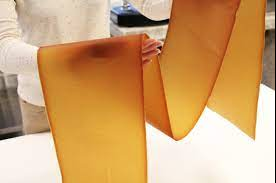
Leather and synthetic leather production have a large negative environmental impact due to resource-intensive processes and hazardous chemicals used during production. VTT’s research team demonstrated that VTT’s technology enables the continuous manufacturing of mycelium leather sheets by the meter. The approach is applicable to industrial roll-to-roll production. The first product applications for the material could be accessories, footwear, and garments, for example.
“The material has a leathery look and feel and can be as strong as animal leather. It also offers the possibility to be colored and patterned, and it does not contain any backing or supporting materials,” describes VTT’s Senior Scientist Géza Szilvay.
Fungal mycelium is a bio-based raw material that can be sustainably processed into leather-like materials. Until now, increasing the production volume with current methods has been challenging due to mycelium cultivation taking place in a planar two-dimensional form limited in size. “Our process makes it possible to overcome these size limitations,” says VTT’s Research Scientist Manuel Arias Barrantes.
VTT’s patent-pending technology for producing mycelium leather alternative materials is based on growing mycelium in common bioreactors. The benefits of this approach are that liquid fermentation in bioreactors is easily scalable to commercial scales and similar fermentation technology is already widely used in the food, chemical, and pharma industries.
The film-making process developed by VTT enables continuous mycelium leather alternative production using VTT’s pilot equipment. The benefits of this manufacturing method are consistent quality, competitive production price, and reduced amounts of offcuts.
At the moment, the VTT team is exploring applications in the accessory, footwear, and garment segments. The researchers are now turning to improve tear strength and abrasion resistance by bio-based approaches.
The work done at VTT will contribute to an accelerated availability of mycelium leather alternatives in the market.
Business Finland has funded the development work.
Author
Geza Szilvay
Source
VTT research, press release, 2021-07-07.
Supplier
Technical Research Centre of Finland (VTT)
Share
Renewable Carbon News – Daily Newsletter
Subscribe to our daily email newsletter – the world's leading newsletter on renewable materials and chemicals











